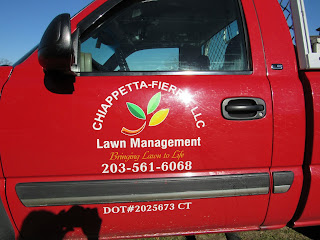TURI Grant
Funds Municipal Training, Six Pilot Sites & Future Plans
By Kathy Litchfield
SPRINGFIELD,
MASS. – Springfield is going organic,
thanks in part to a $20,000 community grant from the Toxics Use Reduction
Institute (TURI) in Lowell, MA that funded trainings and technical assistance
for implementation of organic land care practices at six public pilot sites
over the last year and a half.
The
properties include the Frederick Harris School grounds, Sweeny Athletic Field
at the High School of Commerce, Forest Park athletic field, Tree Top Park, Camp
Wilder and the terrace at Mason Square. The results from these pilot sites have
provided the foundation to expand the program to 50 school properties and 900
acres of managed public land, according to Lynn Rose, Project Coordinator.
In
recognition of the City’s efforts, the NOFA Organic Land Care Program will
award the City of Springfield with an Organic Leadership Award on Dec. 14 at
the NOFA Annual Gathering. Chip Osborne will present the grant project and
specifics on the rewards and challenges of how the work in Springfield is
progressing.
“We
are extremely proud to accept the $20,000 grant from TURI, which will start the
vital process of integrating organic fertilizers in the maintenance practices
of our open space across the City. It is time we take the lead in the Pioneer
Valley by encouraging both residents and businesses to join us in the
protection of our open space and water resources by using organic fertilizers.
I am convinced this will have long-term impacts and improve the overall health
of our urban environment,” said Mayor Domenic Sarno at the time of the grant
award.
The
project came together through a perfect storm of events, according to Lynn
Rose, who has worked with the City of Springfield for seven years developing
and implementing environmental programs in the City, including integrated pest
management (IPM) techniques and laws on public properties. She’s a member of
the Northeast IPM School Working Group, and conducted extensive research into pest
IPM methods, but over time found herself frustrated with the restrictions of
IPM. She had hoped that eliminating all toxic pesticides and synthetic
fertilizers was possible.
At that time, she was approached by Maryanne
Jule, a resident, who was interested in helping the city lands become
organically managed. Together they pursued additional resources.
She
called the national organization, Beyond Pesticides to identify resources
specifically designed for municipal issues. As a result, she enlisted Chip
Osborne to teach a municipal training in organic care for athletic fields, city
terrace and building grounds.
Springfield then partnered with several citizens,
Better Life Whole Foods, and the cities of Northampton and Holyoke, and applied
for a TURI community grant to help train employees to implement organic land
care practices on six properties in Springfield, and train residents on organic
lawn care.
Since the grant award, the Springfield
Department of Parks, Buildings and Recreation Management, under the leadership
of Executive Director, Patrick Sullivan, has been hard at work testing soil,
developing bid specifications for materials and labor, creating a program
budget to implement organic land care practices and conduct trainings for
staff, community groups, residents and homeowners and the grant’s municipal
partners -- all with Chip Osborne at their side.
“Chip Osborne is a force of nature – he has
made a pivotal difference in how the staff and administration see and do things,”
said Rose. “It was fascinating, at Chip’s very first training, to see how
everyone came together. There were people who didn’t realize how willing the
administration and the staff were to consider organic management. Chip brilliantly illustrated how feasible it
was and how much sense it made.”
Osborne also outlined how it is possible to
save 20 percent of costs in the long run once organic methods are established,
said Rose, which will ultimately help the City defend its decision to make this
transition to organic.
After Chip’s training, the staff all came
away thinking, “Why would we do anything else (but organic)?” said Rose.
Over the last year, Sullivan and Osborne have
worked closely to integrate the “systems
approach” to building soil fertility to prevent disease, insect and weed
infestations, maintain soil biology, use proper fertilization for optimum plant
health, choose the right grasses to thrive in the different conditions of the
six pilot sites, and integrate preventative strategies and products for
long-term care.
The parks involved in the grant had
challenges the program would need to address – bare spots on fields that pose
unsafe playing surfaces and encroachment of poison ivy and other weeds that
pose life-threatening bee allergic reactions. Rose said the City is committed
to choosing organic methods to battle these issues.
Sullivan said, “The green industry now offers
organic products that are affordable and will have a long-term impact in
improving the overall health of our turf eco systems. We also will be saving
money in the long run.”
According to Rose, the City is moving away
from using synthetic fertilizers “that can leach into groundwater, streams,
rivers and lakes and cause negative health effects in children and pets.” They
are basing their fertilization on soil testing results.
She said they have already expanded the
number of pilots, and will continue to transition all of the public lands.
Future initiatives include writing a grant to the Environmental Protection
Agency to identify and address stormwater runoff issues from herbicide and
synthetic fertilizer use by residences and businesses in Springfield; and
working with the Operational Services Division (the agency that establishes
contracts for state agencies and municipalities to purchase products and
services from) to source organic products so that they are attainable by municipalities
and state agencies.
“Once the products are available on state
contract, state agencies can also begin the transition to organic,” she said. “Maybe
the transition will take years, but it is doable and we can make changes
statewide.”











 =
=